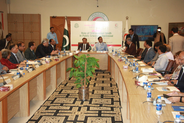The Office of the Provincial Ombudsman Sindh, in partnership with the Pakistan Red Crescent Society (PRCS) Sindh, hosted a high-impact awareness seminar on 24th July 2025 aimed at enhancing citizen engagement, improving access to justice, and fostering collaborative humanitarian action.
In his presidential address, Mr. Mohammad Sohail Rajput, Provincial Ombudsman Sindh, highlighted the urgent need to bridge the gap between institutions and the public. “Out of a population of 55.5 million, only 9,000 complaints have been filed - an indication of limited public awareness and institutional trust,” he noted. Impressively, over 6,700 of these complaints have already been resolved. Mr. Rajput also outlined a series of forward-looking reforms, including the digitization of the complaint redressal mechanism, the launch of a bilingual mobile application, and an upcoming Memorandum of Understanding with PRCS Sindh to strengthen joint efforts in public service delivery and disaster response.
Mr. Rehan Hashmi, Chairman, PRCS Sindh, praised the Ombudsman’s leadership and emphasized the critical role of outreach in enabling citizens to access free, timely, and impartial justice.
Insightful presentations were delivered by Mr. Imdad Hussain Siddiqui, Director, Climate and Disaster Justice Unit, Ombudsman Sindh Secretariat; Mr. Masood Ishrat, Registrar, Ombudsman Sindh Secretariat; and Mr. Kanwar Waseem, Provincial Secretary, PRCS Sindh.
The seminar brought together provincial leadership and representatives from UN agencies, international NGOs, community-based organizations (CBOs), local support organizations (LSOs), civil society organizations (CSOs) and other humanitarian partners. Their active participation highlighted a growing momentum towards collaborative, citizen-centric governance and resilient public institutions.
This milestone event positions the Provincial Ombudsman Sindh as a regional model for innovation in ombudsmanship, emphasizing transparency, digital inclusion, and cross-sectoral cooperation to protect and empower citizens.
Source: The Office of the Provincial Ombudsman Sindh, Pakistan

